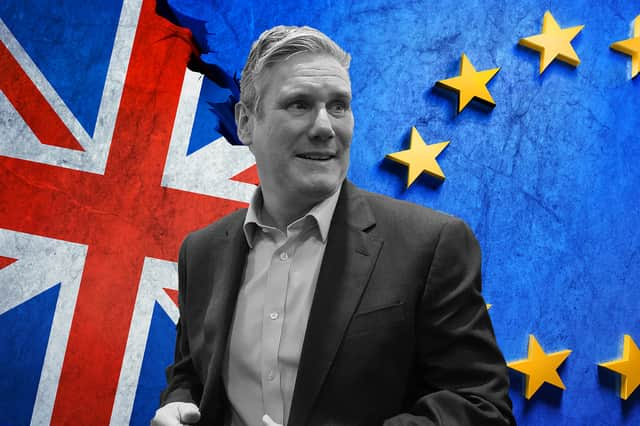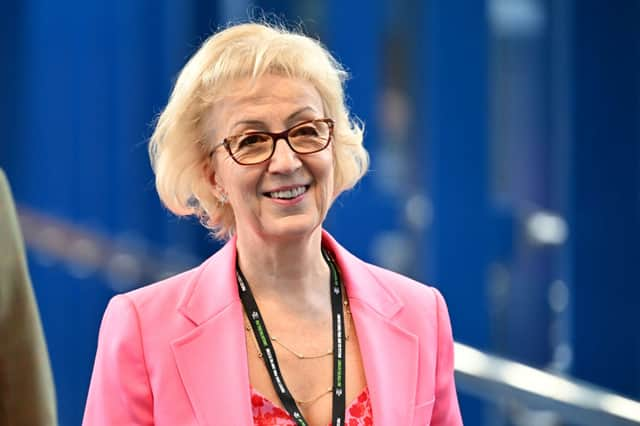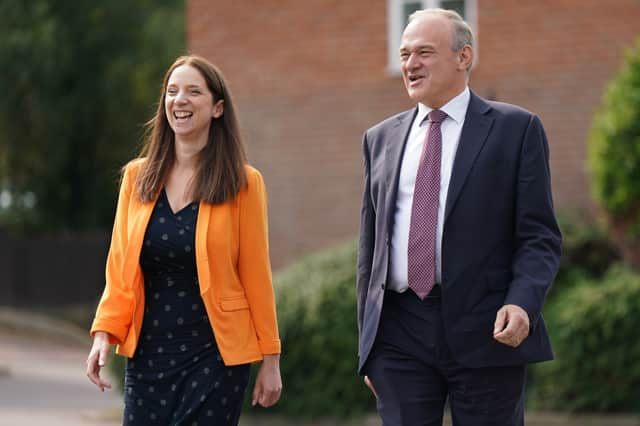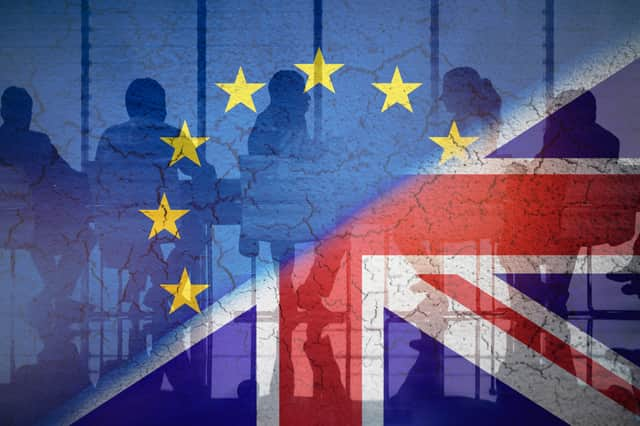A new Brexit consensus is emerging amongst Tories and Labour - and it leaves rejoiners out in the cold
and live on Freeview channel 276
“I can announce that an in-coming Labour government will legislate immediately for that [EU] referendum to take place,” Sir Keir Starmer told a captive conference audience.
That was Starmer telling the Labour Party conference that he was in favour of a new referendum to decide whether the UK rejoins or stays out of the European Union … in 2019. Well four years is a long time in politics, particularly for Starmer. Since then, he’s become Labour leader and now believes there’s “no case” for rejoining the EU, the single market or the customs union.
Advertisement
Hide AdAdvertisement
Hide AdAnd Starmer’s Labour Party is firmly behind him on this. “There’s now way we’re moving on that,” a senior Labour official told me at the conference in Liverpool. Which means, despite Brexit regret reaching an all-time high, with 63% in favour of rejoining according to WeThink, a consensus is emerging between the main parties which is taking that option off the table.
'Trying to reverse Brexit - it's an impossible proposition'
Not so long ago, as you’ve read, Starmer was advocating for a second referendum. At that 2019 Labour conference in Brighton, when he was Shadow Brexit Secretary, he said: “I have a very simple message today: If you want a referendum – Vote Labour. If you want a final say on Brexit – Vote Labour. If you want to fight for Remain – Vote Labour.
“Labour will let the people decide. Conference, you know where I stand on the question of Remain: I’ve said many times that I will campaign for it. But I profoundly respect those who take a different view.”
And Starmer certainly has shown the latter part of that statement is true. Boris Johnson won a huge majority in the 2019 general election, campaigning on “getting Brexit done”, and the Labour leader appears to have accepted that - even if that may upset pro-EU members of the party.
Advertisement
Hide AdAdvertisement
Hide Ad

In Liverpool, four years later, Shadow Foreign Secretary David Lammy outlined the party’s position. “Earlier this year the Conservative Party press office attacked me for saying that improving our relationship with the European Union will be a priority. Conference, I’m happy to repeat it,” he said.
Lammy cited the importance of trade, security and crime co-operation and university links. He added: “With Labour there will be no return to the Single Market or the Customs Union. But Keir Starmer is committed to improving our relations with the EU. Delivering Britain a much better deal. And seeking a new security pact to keep our country safe.”
And this was echoed even amongst some of the most pro-EU MPs in the party. Stella Creasy told a fringe event I attended: “Whoever has tried to get toothpaste back into a toothpaste tube after they’ve accidentally squeezed out too much - that is what trying to reverse Brexit feels like. It’s an impossible proposition - so what we need to do is to set out what we can do instead.”
While Shadow Northern Ireland Secretary, Hilary Benn, said: “If we’re going to make any progress on anything with our relationship with the EU, or the world more generally, you have to have trust.
Advertisement
Hide AdAdvertisement
Hide Ad“The antics of the current government, in Downing Street, particularly under Boris Johnson and Liz Truss, totally destroyed trust between the UK, the EU and the Republic of Ireland.” So what’s clear, if Labour wins a majority, there will be no mandate for any sort of closer union with the EU.


'I feel incredibly optimistic'
Surprisingly, there were similar statements at the Conservative conference, the week before in Manchester. While no one in the Labour Party was singing the praises of Brexit like Rishi Sunak did, Andrea Leadsom did speak about her positivity in the new relationship between Britain and the bloc.
Speaking on a panel with EU ambassador for UK Pedro Serrano, Leadsom said: “I was a passionate Brexiteer and I will remain so, but I do agree that things have changed immeasurably and what we now see - instead of the EU having a very tricky housemate - they have a very friendly and collaborative neighbour.”
She continued: “We’re all on the same page, we’re working through the issues we need to fix, where we need to work more closely together. We’re working in collaboration to defeat Putin’s aggression in Ukraine, and of course in one of the biggest challenges which faces the world, climate change. I feel incredibly optimistic, not for ever closer union with the EU, but neighbourly friendship between two equally sovereign states.”
Advertisement
Hide AdAdvertisement
Hide AdWhile there is still infighting over whether it’s the right Brexit, at a different fringe David Jones MP said the Windsor Framework left the UK with its “right foot in the EU”, the Tories will not be looking for any closer relationship with the EU anytime soon.


'Not focusing on Brexit'
Not even rejoiners can rely on the support of the Lib Dems any more. After Jo Swinson lost her seat in 2019 while campaigning to cancel Brexit, Sir Ed Davey has changed tack. At conference, while Davey spoke about Europe for quite some time - he didn’t mention rejoining the EU once.
The Lib Dems say that after “the trading relationship is deepened, and the ties of trust and friendship are renewed” they want rejoin the single market. However, speaking to Lib Dem candidates they seem reluctant to talk about this.
Emma Holland-Lindsay, who’s hoping to replace Nadine Dorries in Mid Bedfordshire, dodged the question when I asked her simply - what relationship should the UK have with the EU? She told me: “My focus on this election is delivering on the priorities for the people of Mid Bedfordshire, when I’m knocking on doors primarily what they’re focusing on is being let down by the Conservatives.
Advertisement
Hide AdAdvertisement
Hide Ad“People do accept that the deal we’ve got with this Conservative Party is not delivering for people, however actually my top priority is about things like healthcare services and the cost of living crisis - because those are the things that people in Mid Beds are really concerned about, and they’re seeing the impact every single day.”


'There's a real sense of fatigue around Brexit'
Why are the parties able to largely ignore Brexit? Well there’s a paradox. When people are questioned about it - support for rejoining is strong. As previously mentioned, a WeThink poll from the 12 to 13 October found 63% of people are in favour of rejoining, while 37% want to stay out of Europe.
Brexit regret, Bregret, has been steadily increasing over the past year, as people have equated leaving the EU with economic struggles. For the first time recently, a plurality of people wanted a fresh referendum in the next decade.
However, despite all of this - most people are ambivalent or even fatigued about the Brexit debate. Polling from UK in a Changing Europe found “respondents express a real sense of fatigue around the Brexit debate and high levels of indifference towards the future of the UK-EU relationship. Even around a third of Remainers now feel indifferent about its current status”.
Advertisement
Hide AdAdvertisement
Hide AdThe report said: “The dominant feeling among those we talked to was simply ambivalence. For many, there are more pressing issues – the economy, NHS, immigration – to talk about. For Labour, a wholesale rethink of the UK-EU relationship may not have the electoral payoff many expect.”
Seb Wride, director at Public First, a think tank which has carried out extensive polling on Brexit, agrees: “The next election will be fought and won on different issues: NHS, cost of living, immigration. The public has mostly moved on from Brexit, and there’s more risk in reopening the discussion than ignoring it, particularly for Starmer when he’s trying to win over substantial numbers of Leave-voting 2019 Conservatives.”
And he added: “It’s a mistake to read the current lead in polls that pro-Remain sentiment has over pro-Leave as evidence parties should be campaigning for rejoin. A majority of Leave voters believe that Brexit will work out in the long-run, and are more likely to think that Brexit was bungled than doomed to fail.
“Calling for a new referendum would be a risk for any of the parties, opening them up to all sorts of arguments about the concessions the UK would need to make to the EU, ignoring the key issues at the moment, and adding further fuel to the view that politicians these days cannot be trusted to deliver.”
Advertisement
Hide AdAdvertisement
Hide Ad'Brexit is a catastrophe'
All this leaves the people who are passionate about rejoining the EU out in the cold. John McPhie, founder of the campaign group Rejoin and Reform, told NationalWorld: “Starmer has had this Brexit omerta since December 2019, and he has said absolutely nothing against Brexit all that time.
“Brexit is a catastrophe, we’ve got huge problems about to hit us - such as when we start imposing border import controls on what’s coming from the EU. That’s going to completely knacker the supply chain, we’re going to see price rises and empty shelves. The only sensible way of doing that is by rejoining the single market and the customs union.”
She told NationalWorld: “Starmer has obviously made a decision not to go near Brexit until Labour have won power. But once he’s won power and is in office, he faces an increasingly worsening food crisis and can’t fix it because he won’t have a mandate to get back in the single market.”
So while Bregret increases, paradoxically the chances of rejoining the EU appear to be shrinking.
Comment Guidelines
National World encourages reader discussion on our stories. User feedback, insights and back-and-forth exchanges add a rich layer of context to reporting. Please review our Community Guidelines before commenting.
